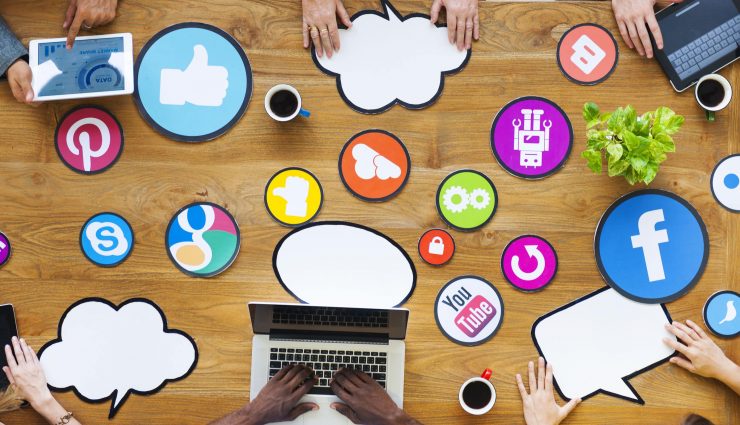Social Media is making us more poisonous, fake, and toxic than ever before. Particularly depression stemming from loneliness and failure to find a sense of belonging in society.

Social Media’s impact on our identity
“I believe in feminism” “I believe in women’s rights” and “TransLives” Social media is making us more fragile, fake, and toxic than ever before. We really need to talk about it because of the alarming effect it’s having on our identity. Let’s talk. On any given day, we’re exposed to hundreds and thousands of profiles.
We observe their lifestyles, activities, fashion choices, senses of humor, and even their opinions, beliefs, and moral stances. And amidst this online sea of 4.5 billion people, we all long for acceptance and are vulnerable to their validation in one form or another. And this is making a permanent difference on our identities and our sense of self.
How does social media define a successful profile?
Well, it all comes down to the way social media works. You see, in order to create a successful social media profile or identity, you need to increase likes, shares, and engagement. Usually, this is done by giving in to what your friends, followers, and online audience find appealing and by following the wishes of the algorithm.
For instance, you have to advertise X if it is well-liked. “Women’s rights are important” is a statement that is true; it is only an illustration. As a result, you will receive likes, shares, and comments from your audience, and the algorithm will promote your interaction by placing you on other people’s timelines and news feeds. This will release dopamine in your brain, which will naturally encourage you to carry out the action repeatedly.
“Woman’s rights are very important, they are extremely important and dear to me” You get the point. Now this entire cycle pretty much creates echo chambers online, where people keep posting content that is popular amongst their circle, which pleases their audiences and the algorithm. Now this of course is nothing wrong when it’s delivering you good quality content, like on OnePath Network and others.
But the issue arises when it begins to deliver content that’s actually harmful. I mean, the algorithm doesn’t care if what you’re posting is beneficial or increases people’s spiritual or moral fulfillment, it doesn’t even care where you stand on the side of a conversation, you could be on the right or the left, it doesn’t matter.
It only cares that what you’re posting is attractive enough to keep people glued to their screens. And that’s exactly where the issue is. Being famous on the internet and using a formula to build a successful online persona is not a sign of one’s worth or value. You could be sharing stuff, like the majority of popular accounts do right now, that causes young girls to experience anxiety and sadness. Still, keep up a prosperous online persona.
How algorithms are making us more toxic?
You could even be a complete fraud and parade empty moral slogans all across your page and still achieve a successful online identity, attracting large audiences and being favored by the algorithm. All this and I still haven’t even touched the most dangerous of threats of war.
You see, striking research shows that the algorithm has proven to favor content that is more polarizing and negative in nature. only because this kind of information is more interesting and popular. “Misinformation, angry content is enticing to people and keeps them on the platform” So for us, it’s no longer enough to say “Women’s rights are important”, but rather “Men are trash, men are really bad, I hate men so much.
further engagement and of course more dopamine encouraging us to continue the process. It’s no wonder we’re seeing a rise in anger, hatred, and division online, even amongst Muslims themselves. Online, we’re becoming more toxic than ever before and this is not because it’s in our best interest to be angry people, but rather it’s what keeps people engaged and helps platforms make more money.
And this is nothing new, I mean anger was one of the foremost emotions tapped into by Hitler to further his popularity via the radio, and it’s still happening today. Only this time with the help of algorithms. The dangers surrounding social media and its impact on our identities are very real. It’s also something that Muslims ought to be really worried about.
Similar Posts
- Why AI is Harmful for Muslims? | AI SCIENTIST From Google Sends Warning to Muslims
- How The Nightclub Turned peoples Into Muslim? – Full story
Why Muslims should be very concerned?
As Muslims, we do not follow fads or trends at random or allow ourselves to be influenced by them. Rather, we adhere to the teachings of the Prophet, taking what he says and refraining from what he forbids.
Our quest to please Allah in all we do is completely at odds with the fixation on pleasing an invisible algorithm and an internet audience.
It’s a fragile way to form our identities and it’s something we should be deeply wary of. So many times in the Quran, we see a strong condemnation of just following that which is popular.
Good and evil are not equal even though you may be dazzled by the abundance of evil. And of course, If you were to obey most of those on earth, the popular masses, they would lead you away from Allah’s way. And this couldn’t be more pertinent and important than it is today.
I mean today in the age of feeling. “And I would say that our age is the age of feeling” Where people’s unrestrained desires and feelings define the popular way in which society determines right from wrong, we should be very concerned. We are literally warned about following our desires in the Quran so many times, but desires are exactly what most people are using today to define their morality.
According to the Reports of OnePath Network
The solution for Muslims today
This is not to mention the fact that what is popular and acceptable amongst the masses today, can very well change tomorrow. That which will bring you audiences and the pleasure of people today can very well have you canceled tomorrow. This is why we as Muslims must develop our identities without the hidden manipulative pressures of social media and algorithms.
Before we enter the wild world of social media, we need to find our foundation in who we are. We need to study our religion Islam, and find out who we are as muslims, what our principles es, and what are our values, away from the pressures of algorithms. We are bombarded with so many world views, philosophies, opinions, and doubts online that are popular and accepted by the masses.
We need to know how to deal with them as Muslims and once again, I don’t deny that social media can also have a positive impact on our identities when it’s applied appropriately and when we engage and are exposed to the appropriate individuals who possess the appropriate ideas and perspectives. But the dangers are still very genuine and it’s something we need to be wary of.
I ask Allah to make us of those who follow the Prophet, ﷺ and not popularity, those who seek the pleasure of Allah and not the pleasure of audiences and algorithms. Ameen.
FAQ’s of Social Media’s Corruption Manipulate Our Muslim Culture?
Q1: How Social Media’s impact on Muslims identity?
Ans: Social media is making Muslims more fragile, fake, and toxic than ever before. Particularly depression stemming from loneliness and failure to find a sense of belonging in society.
Q2: How algorithms are making Muslims more toxic?
Ans: You could even be a complete fraud and parade empty moral slogans all across your page and still achieve a successful online identity, attracting large audiences and being favored by the algorithm
Q3: Why Muslims should be very concerned?
Ans: As Muslims, we do not follow fads or trends at random or allow ourselves to be influenced by them. We are literally warned about following our desires in the Quran so many times, but desires are exactly what most people are using today to define their morality.
-

Top 7 Reasons Russian Girls Move to Dubai in 2026 – Russian Expats, Lifestyle & Career Guide
-

7 Secrets of Soapy Massage: Step-by-Step, Benefits & Myths
-

K-pop girls vs Korean girls: 5 Truths of Korean Girls Looking Like K-pop Idols
-

Top 10 Massage Clothing & Comfort: What to Wear, Draping, Oils & More for the Best Spa Experience
